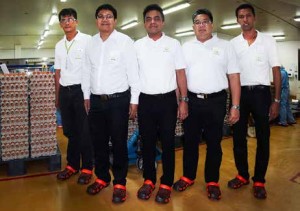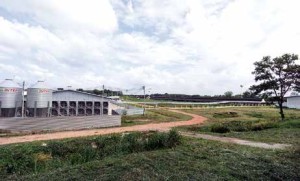With an eye on becoming Thailand’s leading brand, Betagro Group Plc has invested heavily in boosting production. But it’s about more than just cranking out more meat and eggs.
Along with upgrades to its poultry and pork processing plant in Pattalung and a rebuilt layer farm in Songkhla, the company has adjusted its business model to optimize capacity utilization to build a stronger business overall, according to Trirat Thongplod, vice-president for regional business.
By increasing the number of regional offices and shops to accommodate its growth strategy, Betagro’s revamped business operations will be geared more towards higher margin meat and food products.
Currently, Betagro distributes meat and egg products via 86 regional office branches, and up to 160 Betagro shops are to be opened by the end of 2016.
“These channels are going to be more important,” said Mr Trirat.
The south of Thailand’s economy has faltered in the past two years due to declining consumption, plummeting rubber prices and a dwindling number of visitors.
Nevertheless, by the second half of 2016, Betagro plans to open three new shops in fast-growing Phuket, Suratthani and Songkhla.
Brand awareness is the key to Betagro’s growth strategy.
“Our business is changing. We are shifting from being production driven to market driven, using our reputation for stringent quality and safety assurance, and an above-the-line marketing campaign,” he added.
With multiple production bases established in major regional cities, it enjoys advantages in customer service and product quality.
In Pattalung, its newly renovated poultry processing plant has raised daily output to 90,000 birds/day on a two-shift basis. Birds are processed primarily for export, raising the export capacity of the entire group.
An improved waste treatment system and new deboning machines for thigh and drumstick meat have increased plant throughput. customers. The first shipment will go out by Q1, 2016. Meanwhile, workers are being coached so that their daily productivity will be on par with Betagro’s other processing operations, said Mr Trirat.
Around 150 million baht has gone into an expanded hog slaughtering plant with a capacity of 400 head/day, up from 250 head. Machine installation is nearly completed and full operations will resume in May 2016.
The new processing capacity will help Betagro shift its business focus from primary production to meat and food. The livestock business will continue as a mainstay, but the volume of live animal
supply will gradually decrease as the product mix evolves toward items offering higher profit margins.
Distribution via regional offices and food service segments are expected to gain a greater focus in the future.
However, existing alliances in the wet market segment, a traditional distribution system which continues to generate cash and show moderate growth, will be maintained.
The food service segment, primarily factories and hospitals, as well as food industry buyers, small independent meat shops and bakeries, are seen as rising stars due to their tremendous growth in recent years.
Betagro projects that its regional business will contribute 32 billion baht, or 18.5% of overall growth Y-O-Y. For 2016, the northeast will account for 10 billion, the north 8 billion, the south 6.4 billion, and the central and eastern provinces 8 billion baht.


